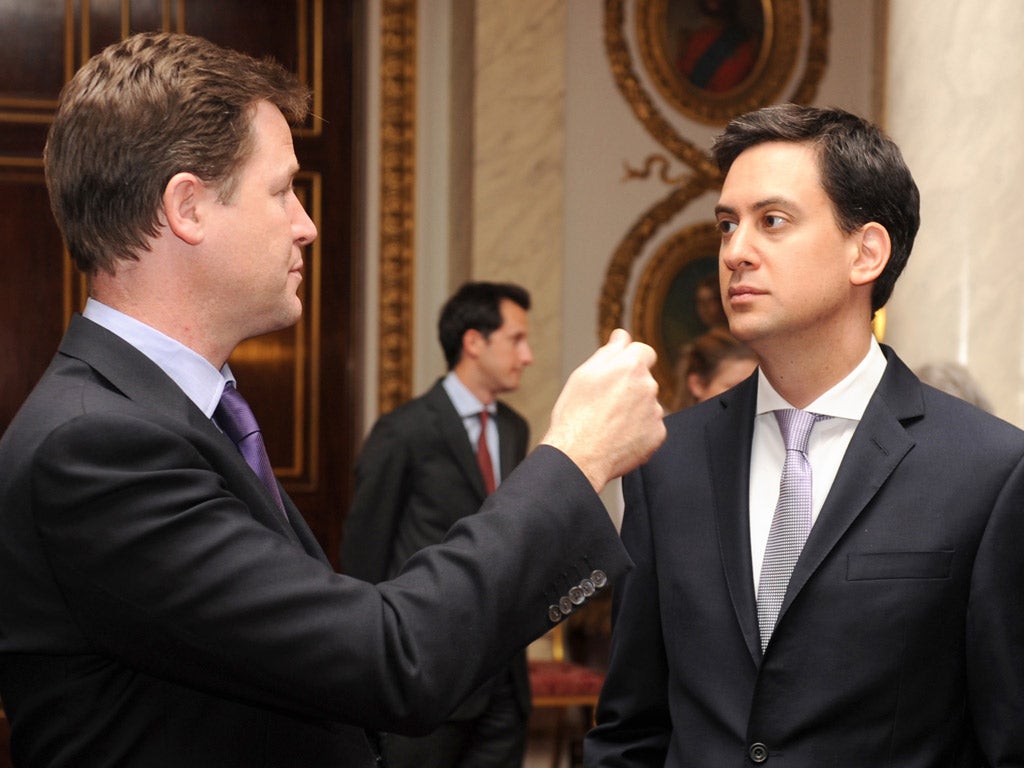Labour aims to capitalise on anger at Clegg
May's elections will be a test of Opposition's ability to attract votes from disillusioned Lib Dems

Ed Miliband will this week launch a fresh attack on Nick Clegg, as the Labour leader tries to capitalise on discomfort among Lib Dem grassroots in the run-up to the local elections on 3 May.
Buoyed by a new poll for The Independent on Sunday today showing Labour's lead over the Tories has increased to six points, Mr Miliband will seek to exploit growing divisions between the Deputy Prime Minister and Lib Dem MPs and councillors by appealing to Lib Dem voters.
Labour claims it has evidence showing all mention of Mr Clegg is missing from Lib Dem campaign leaflets, underscoring how unhappy activists are with the central party. The IoS reported this month that the Lib Dems are fielding fewer candidates in key northern cities because of a collapse in their activist base.
In a fresh blow to Mr Clegg's leadership, emails seen by this paper from party constituency chairs and councillors show the extent of anger over the Government's health reforms.
The emails show that some senior activists are proposing to withdraw constituency funds from the Lib Dems' central Cowley Street headquarters in London, or pay the "bare minimum" in subscriptions.
But there is also bad news for the Labour leader, as the IoS/ComRes poll shows, despite Labour's lead in the polls, Mr Miliband's personal rating is lower than Mr Clegg's, at minus 31 per cent versus minus 30 per cent.
Mr Miliband's new pitch to the Lib Dems has been fuelled by research, given to the Labour leader and Shadow Cabinet last week, showing that, in 70 of the top 100 Tory marginals where Labour is in second place, the Lib Dem vote is larger than the Tory majority. Mr Miliband has been urged by senior figures in his party, including Tony Blair, to appeal to these Lib Dems to secure victory in 2015.
The IoS/ComRes poll shows that 43 per cent who voted Lib Dem in 2010 say they would vote for them again, but a significant proportion – 31 per cent – would now vote Labour.
Some members of the Shadow Cabinet are, however, preparing for a Labour/Lib Dem coalition at the next election in the event that Labour cannot win outright.
Despite the public mud-slinging, behind the scenes there is increasing evidence of closeness between Labour and the Lib Dems. Mr Clegg and Mr Miliband have had a handful of meetings in the past year, and a number of Lib Dem ministers report increasingly "cordial and co-operative" relations with Labour counterparts. "We might have to work with them one day," said one Lib Dem minister.
It is understood the Clegg-Miliband talks have discussed a range of issues, but focused on the "common ground" of constitutional reform. Senior Lib Dems say the looming political showdown over Lords reform is a key test of whether the two parties could ever formally unite in the much-heralded realignment of the progressive left.
Tomorrow morning, the Joint Committee on Lords Reform made up of 26 MPs and peers will publish final recommendations for reforming the upper house. Four out of five would be elected, possibly on 15-year terms. Mr Miliband has joined growing calls from Tory backbenchers for a referendum on the constitutional change.
However, within minutes of the report's publication, a breakaway group of MPs and peers from the committee will stage a separate press conference where they will reveal how other members tried to block elections being held in 2015. The pro-reformers include Labour's Ann Coffey, Tories Laura Sandys and Gavin Barwell, and Lib Dem Lord Tyler.
A senior Lib Dem said: "Lords reform is a litmus test of Labour's progressive and reforming credentials. It is also a test for Ed Miliband."
The poll also shows an increase in the proportion who do not trust the PM and Chancellor to make the right decisions on the economy, from 49 per cent in March to 54 per cent now.
Subscribe to Independent Premium to bookmark this article
Want to bookmark your favourite articles and stories to read or reference later? Start your Independent Premium subscription today.

Join our commenting forum
Join thought-provoking conversations, follow other Independent readers and see their replies